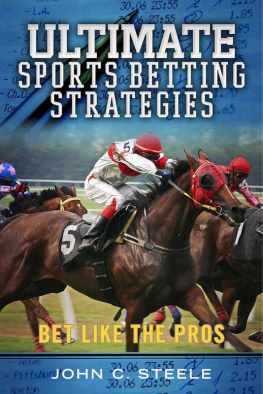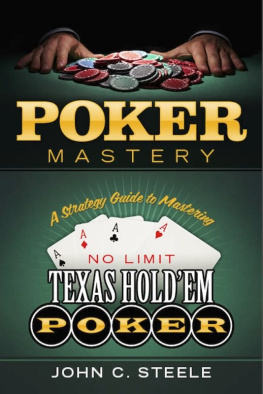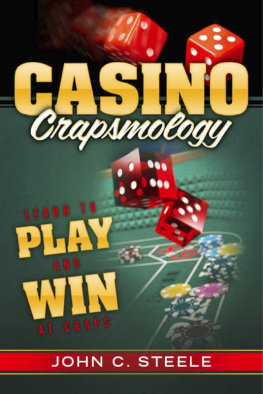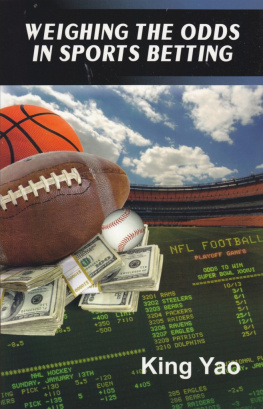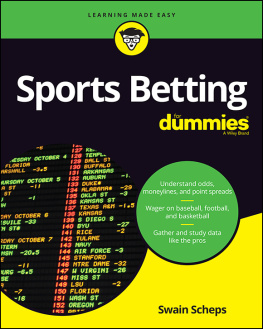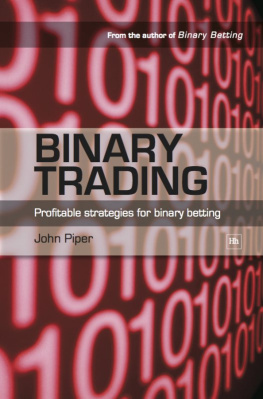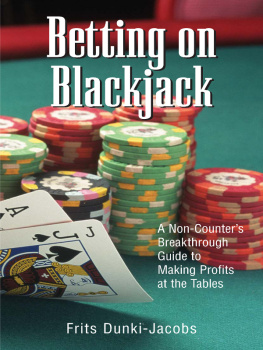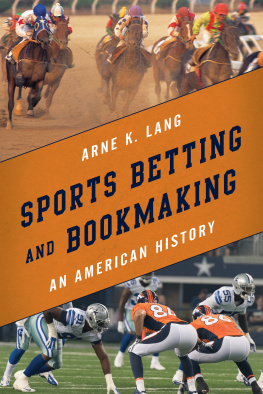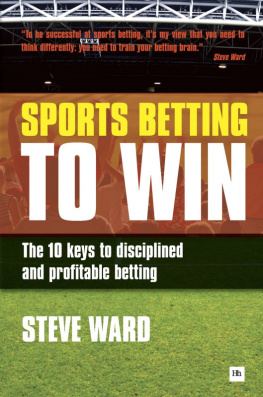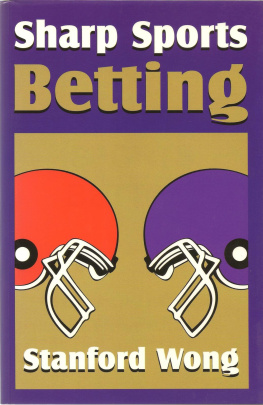John C. Steele - Ultimate Sports Betting Strategies: Bet Like the Pros
Here you can read online John C. Steele - Ultimate Sports Betting Strategies: Bet Like the Pros full text of the book (entire story) in english for free. Download pdf and epub, get meaning, cover and reviews about this ebook. year: 2012, publisher: BookBaby, genre: Business. Description of the work, (preface) as well as reviews are available. Best literature library LitArk.com created for fans of good reading and offers a wide selection of genres:
Romance novel
Science fiction
Adventure
Detective
Science
History
Home and family
Prose
Art
Politics
Computer
Non-fiction
Religion
Business
Children
Humor
Choose a favorite category and find really read worthwhile books. Enjoy immersion in the world of imagination, feel the emotions of the characters or learn something new for yourself, make an fascinating discovery.
- Book:Ultimate Sports Betting Strategies: Bet Like the Pros
- Author:
- Publisher:BookBaby
- Genre:
- Year:2012
- Rating:4 / 5
- Favourites:Add to favourites
- Your mark:
- 80
- 1
- 2
- 3
- 4
- 5
Ultimate Sports Betting Strategies: Bet Like the Pros: summary, description and annotation
We offer to read an annotation, description, summary or preface (depends on what the author of the book "Ultimate Sports Betting Strategies: Bet Like the Pros" wrote himself). If you haven't found the necessary information about the book — write in the comments, we will try to find it.
Ultimate Sports Betting Strategies: Bet Like the Pros — read online for free the complete book (whole text) full work
Below is the text of the book, divided by pages. System saving the place of the last page read, allows you to conveniently read the book "Ultimate Sports Betting Strategies: Bet Like the Pros" online for free, without having to search again every time where you left off. Put a bookmark, and you can go to the page where you finished reading at any time.
Font size:
Interval:
Bookmark:
Copyright (c) 2012
All rights reserved. No part of this book may be reproduced or transmitted in any form by any means graphic, electronic, or mechanical without permission in writing from the publisher or author.
This publication is designed to provide accurate and authoritative information in regard to the subject matter covered. The publisher or the author disclaims any personal loss or liability caused by utilization of any information presented herein.
Visit the authors website:
http://www.GamblingProTips.com
ISBN: 9781623098810
More Books by John C. Steele:
Roulette Secrets Revealed
Poker Mastery: A Strategy Guide to Mastering No Limit Texas HoldEm Poker
The Science of BlackJack: Card Counting Secrets and Strategies
How to Win BIG at Baccarat
Casino Crapsmology: Learn to Play and Win at Craps
Slot Machine Junkie: How to Win at Slots Consistently
Table of Contents
Why Bet on Sports
Most games have some sort of official history telling us how they began and the transformations they went through, even if there are a few competing versions. But betting on sports seems to be as old as sports themselves. That is to say really, really old.
Although some people scoff at sports as unimportant, they have played an important role throughout human history, giving cultures a way to compete with each other aside from going to war. From the Chinese Lion Dance, which allowed martial artists to display their prowess outside of combat, to the original Olympics that gave Greek city-states a way to strut their stuff, sports have always been a proxy for larger issues.
Even in the modern world, the Olympics stood in for Cold War tensions for decades and people today worry over whether the US will continue to win more gold medals than China and what it would mean if China were to win. Americans support their local teams, and European football teams are often affiliated with political parties.
Sports can be transcendent, and if you arent one of the few people gifted enough to take part directly, betting on games ties you more closely to the results so that you can be part of the experience.
But thats not what this book is about. Dont get me wrong, I dont see anything wrong with betting on your favorite team every week. Youll lose money doing that, but you also lose money going out to the local bar or taking a vacation. You can spend your money however you want without criticism from me.
This book is about how to make money gambling on sports. Im going to teach you a system that will turn your understanding of the game into an iterative prediction system that gets better over time as you get rid of your own biases and learn what is most important for predicting winners.
If you have ever read books about casino gambling systems, then you are familiar with systems that need to be learned in order to gain a statistical edge over the house. There may be a lot of instructions to follow, but at the end of the day you are really just following a complex set of instructions and relying on probability to do the rest. As long as you are seated at a fair game, the system will work.
Gambling on sports isnt random in the same way as casino games. With dice, you cant predict what number will come up when you toss a die, but you can say with certainty that there is a 1/6 chance of throwing a three.
In football, not only can you not say whether the receiver will catch an all-important game-winning pass, you cant even calculate his odds with any real confidence. To paraphrase a former politician, casino games deal with known unknowns, but when you bet on sports you are dealing with unknown unknowns. If the starting pitcher is coming down with the flu then he isnt going to pitch very well, but how can you account for that before the game begins? You cant, and thats why gambling on sports is more difficult than casino games.
Dont get discouraged, Im going to teach you a system that really works, but only if you work the system.
The iterative prediction system uses feedback to constantly adjust its prediction (one iteration is one step in a repeating process, thus the name). As you get more and more feedback, your system will improve and your wagers will become more likely to win. Not guaranteed to win, but significantly more likely. Combining this system with good value betting and bankroll management, you will be able to bring in a steady stream of cash while watching your favorite sports.
The Basics
Before we get into the meat of how to develop your own winning system, we need to cover the basics of sports betting. This section will go over everything you need to know to place rational bets. If that sounds weird, remember that lots of people just place bets based on what team they like or who the underdog is. Some people actually bet against their favorite teams so that they are always happy at the end of the game!
If you are just having fun, thats fine, but this book is about betting to earn a profit, and that isnt possible unless you have a clear understanding of what your bets actually mean.
Risky Business
The first thing to know is that odds are often presented in different, seemingly contradictory ways: decimal odds (also called the international system), fractional odds and the US system. Lets start with an example: if you have determined the Patriots are twice as likely to win as the Titans on Saturday, and you want to bet against the Pats, how would each system express those odds?
Fractional Odds: 2:1
Decimal Odds: 3.00
US Odds: +200
Fractional odds are actually numerators of the associated fractions. The Patriots will win 2/3 of the time and the Titans will win 1/3 of the time, so the ratio is (2/3) : (1/3), but that looks pretty bad, so we leave out the denominator (the 3) and just write 2:1.
Lots of people find fractional odds to be the most intuitive because you can essentially read them off. 2:1 means the favorite team is twice as likely to win as the underdog, 4:1 means they are four times more likely to win, 3:2 means they would win 3 out of 5 games on average, and so forth.
Decimal odds are confusing to some people because if you convert 2/1 to decimal form you get 2.00, not 3.00. The difference is because bookies add 1.00 to the fractional odds. That means that 3:2 would be 3/2 + 1 = 1.5 + 1 = 2.50. Even odds, 1:1, is 2.00 in decimal odds. The reason for displaying odds in this way is that, once you get used to them, it becomes really easy to calculate your potential winnings.
US odds tell you how much you will make if you bet $100 or how much you have to bet to get $100.
So in the example above if you bet $100 against the Pats and they win, you lose $100. If that seems too obvious to mention, there are bets available where there is no limit on your potential loss. Realistically, you will negotiate a maximum loss with your bookie, but its worth knowing now that not all bets have a fixed risk.
If the Pats lose you will earn $200 (on top of keeping your initial $100). Looking at fractional odds, you have won 2 dollars for every 1 dollar you wagered. For decimal odds, you would multiply your stake by the given odds and then subtract your stake back out. So $100*3 - $100 = $200. For US odds you win $200 for every $100 wagered. Since you wagered exactly a hundred dollars, you will get two hundred back.
If you had wagered $100 on the Patriots and they won, you would have gotten $5o. Fractional odds have the advantage that they look the same whether you bet on the favorite or the underdog (2:1 for instead of against), but decimal odds and US odds look different
Fractional Odds: 2:1
Decimal Odds: 1.50
US Odds: -50
The negative sign on the US odds just means that you will profit less than you wagered if you win the bet. You are still looking to get $50 for every $100 that you bet.
Next pageFont size:
Interval:
Bookmark:
Similar books «Ultimate Sports Betting Strategies: Bet Like the Pros»
Look at similar books to Ultimate Sports Betting Strategies: Bet Like the Pros. We have selected literature similar in name and meaning in the hope of providing readers with more options to find new, interesting, not yet read works.
Discussion, reviews of the book Ultimate Sports Betting Strategies: Bet Like the Pros and just readers' own opinions. Leave your comments, write what you think about the work, its meaning or the main characters. Specify what exactly you liked and what you didn't like, and why you think so.

